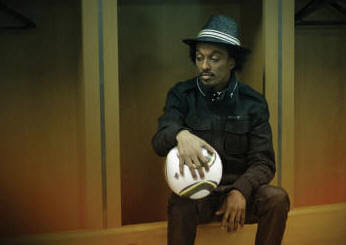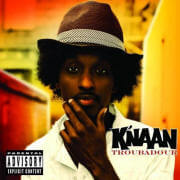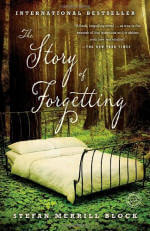Kickin' Back with K'Naan

Somalia. The name alone conjures up images of unbridled destruction, merciless warlords and ruthless terror. A place where nobody is safe from the atrocities of war, and where 8-year olds handle AK-47s like toys. When Forbes magazine recently unveiled their "Most Dangerous Destinations," Somalia, above Iraq and Afghanistan, topped the list. But it's also "The Nation of Poets," where a poem can both inspire peace and end wars.
During his early childhood, the Western music which reached K'naan's ears was pretty much limited to "Bob Marley and Tracy Chapman," until at 10, he became fascinated by the hip-hop being emitting from a tinny car speaker. "I had heard a rap verse, but I had no idea what it was back then," he recalls.
At 14, K'Naan and his three best friends were attacked by warlords, just one of
countless indelible images for the impressionable teenager. Having chased them
through the streets of Mogadishu, eventually cornering the boys in an alley, the
men began shooting. K'naan avoided injury, but his three friends were brutally
gunned down.
Certain that it was only a matter of time before her family met the same fate,
K'naan's mother would travel daily through the firefight to the U.S. embassy in
the hopes of securing visas for her and her loved ones. Despite daily denials,
she persisted, and on the last day the U.S. embassy was in Somalia, received
visas to leave for America.
"You can't even describe it," says K'naan. "It is the most sensational,
liberating feeling. There was the weight of a world of hope on your shoulder
that has suddenly landed. It was only then that I started to get this certain
value of life that I never had before." With little possessions and no knowledge
of English, K'naan and his family boarded the last commercial flight out of
Mogadishu for New York before settling in Toronto.
The tunes on Troubadour reflect the sum of K'Nasan's life experiences. Having
spent the better part of the last two years on the road, visiting over 50
countries from Slovenia to Peru to Vietnam to Uganda, the album is the sonic
document of an artist with much to share, and disproves rap music's detractors
who say that hip-hop has nothing new left to say.
The CD's first single, "Wavin' Flag," has become an international sensation, and
was the official anthem of the World Cup Championship hosted this summer by
South Africa. Reaching over 150 countries, the signature song was featured on
K'Naan's FIFA-sponsored Trophy Tour, which saw the emerging rap star spreading
his message to soccer fans in concerts staged all around the world.
K'naan has also re-recorded new versions of the track with Will.i.Am and French
dance producer David Guetta and a bilingual versions with Spanish pop singer
David Bisbal, French MC Fefe, AI Otsuka from Japan, Jackie Cheung and Jane Zhang
from China, Tattoo Colour from Thailand, Nancy Arjam from Egypt, HHP from South
Africa, and other artists in Greece, Turkey and elsewhere.
K'Naan - The "Wavin' Flag" Interview
with Kam Williams
 Kam Williams: Hi K'naan, thanks so much for the time.
Kam Williams: Hi K'naan, thanks so much for the time.
K: My pleasure.
KW: Celia Chazelle asks, what was the inspiration for Wavin' Flag?
K: I can't remember specifically, it was just one of those moments when I
had a melody in my head and a discontented, melancholy feeling. I just wrote
that.
KW: Did it emanate at all from your childhood?
K: I think everything kinda' does. Everything is kind of shaped by life
in general, so I guess it does feel like my childhood might have been an
influence. But those things are pretty subconscious.
KW: Do you still feel a strong connection to Somalia?
K: Yes, I have many, many memories which have impacted my life.
KW: The Ling-Ju Yen question: What is your earliest childhood memory?
K: We used to have an open-roofed courtyard. My earliest childhood memory
is of sitting around as a child looking up to the sky and dreaming while
listening to poetry.
KW: Were you listening to a lot of American music while growing up?
K: You could live in Somalia forever and never need music from outside
Somalia. There are a lot of different styles and a variety of musical ideas
developing right there.
KW: FSU grad Laz Lyles asks, what did it mean for you to have Wavin' Flag
become the anthem of the World Cup?
K: I used to get very excited watching the World Cup on TV as a child.
So, to have any kind of involvement with the World Cup is a big, big honor.
KW: Children's book author Irene Smalls was wondering whether you're a
soccer fan and if you played soccer in your youth?
K: Yes I am, and I did play, like most other children.
KW: Author/filmmaker Hisani Dubose asks, how have you been received by the
American hip-hop community?
K: Great! You can tell from what's been happening for me. They've all been
very supportive and showing love for what I do.
KW: Irene also asks, where do you think hip-hop is headed?
K: I think it will always go through phases, like how philosophy in
ancient times would celebrate the body and the physical for awhile, then
focus on the mind and the spiritual. I think that those phases happen to us
as well, and hip-hop is one of the best barometers of what is happening,
because it reflects the feeling of young people. I see my music as following
the feeling.
KW: When you look in the mirror, what do you see?
K: [Chuckles] Interesting… I often try to find the face of my teenage
years. I don't know whether it's like this for everybody, but I can't find
it.
KW: What is your favorite dish to cook?
K: It probably would be good if I cooked more, but I just don't do it very often. When I do, I find it very enjoyable. I made a dish about a year ago. It was stir-fried vegetables with Szechuan sauce. I made it a little too spicy, I admit, but I think everybody enjoyed it, aside from all the sweating.
KW: The bookworm Troy Johnson question: What was the last book you read?
 The Story of Forgetting: A Novel Click to Order via Amazon Abel Haggard is an elderly hunchback who haunts the remnants of his family's farm in the encroaching shadow of the Dallas suburbs, adrift in recollections of those he loved and lost long ago. Hundreds of miles to the south, in Austin, Seth Waller is a teenage "Master of Nothingness"—a prime specimen of that gangly breed of adolescent that vanishes in a puff of sarcasm at the slightest threat of human contact. When his mother is diagnosed with a rare disease, Seth sets out on a quest to find her lost relatives and uncover the truth of her genetic history. Though neither knows of the other's existence, Abel and Seth are linked by a dual legacy: the disease that destroys the memories of those they love, and the story of Isidora—a land without memory where nothing is ever possessed, so nothing can be lost. Blending myth, science, and dazzling storytelling, Stefan Merrill Block's extraordinary first novel illuminates the hard-learned truth that only through the loss of what we consider precious can we understand the value of what remains. |
KW: The music maven Heather Covington question: What are you listening to on your iPod?
K: Vampire Weekend.
KW: The Uduak Oduok question: Do you have a favorite clothes designer?
K: I probably do, because I know what I like, but I wouldn't know who it is by name.
KW: Uduak also asks, "How do you think African music will influence the rest of the world in the coming years?"
K: I think it's actually already affecting the world in a big way now.
People just aren't aware of it. For instance, there's a great tune by
Coldplay called "Strawberry Swing." It's essentially Afro-Pop music. And
most of Vampire Weekend's music is Afro-Pop. Africa has influenced many of
the biggest bands. So, I believe Africa has already crept in and changed
music in the West. People just don't know to call it African.
KW: If you could have one wish instantly granted, what would that be for?
K: Wow! That would be for a sudden shift in my country from war, distrust
and death to peace, love and harmony.
KW: The Teri Emerson question: When was the last time you had a good laugh?
K: About a week ago on the road with my band when we were talking. It was
just one of those things where we've been together so long, that a running
joke that's about five years-old could crack us all up for about an hour.
KW: The Tasha Smith question: Are you ever afraid?
K: Yes I am, but not of
what people ordinarily fear, fortunately. My fears are all internal. I'm
afraid of my own self more than of anything external.
KW: The Columbus Short question: Are you happy?
K: Happiness, I think, is one of the most elusive things on the planet. I
believe that happiness is only appreciated in retrospect. So, I'm always
happy, given that I later find out that I was.
KW: The Laz Alonso question: How can your fans help you?
K: By being understanding of the fact that I don't make music for them,
but that I make music that's about my past and about my most honest internal
instincts. They need to understand that more than anything else. Wherever I
go, it's not about them, but where the music takes me.
KW: What has been the happiest moment of your life?
K: The birth of my first son.
KW: The Zane question: Do you have any regrets?
K: I guess I do have some regrets, but none big enough to obsess about.
KW: The Tavis Smiley question: How do you want to be remembered?
K: As someone who was always interested in walking through life in a
positive way and in affecting people in a positive way.
KW: Thanks again for the interview, K'Naan, and best of luck on your world
tour.
K: Thank you so much, Kam.
'Wavin' Flag' by K'naan (Official World Cup Theme Song) on QTV
Related Link